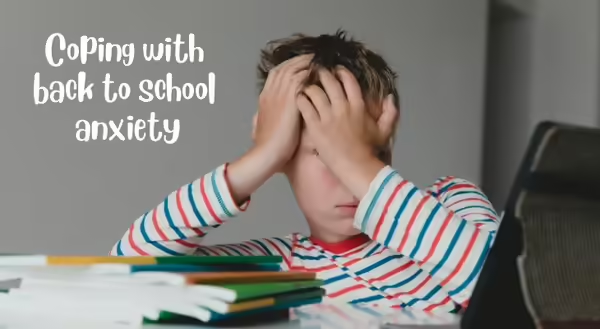
Anxiety disorders are the most common psychiatric diagnosis in school-age children worldwide. Anxiety may appear in different forms, including separation anxiety, social phobia, generalized anxiety, panic with agoraphobia, obsessive-compulsive disorder, and specific phobic disorders causing numerous problems in their lives.
Several issues can develop due to untreated stress, including lower academic achievement, increased difficulties with peers and parental relationships, poor self-esteem and intensified negative self-perception. Some anxiety is normal but be aware of the extreme. Transitioning back to class as summer ends can be a stressful time for children and parents.
Here are a few tips to start working on a week or two before school starts to help with getting back to the school year routine:
- Start setting a sleep schedule that is conducive to the time that one needs to be getting ready for school and going to bed at a reasonable time.
- Organize activities with familiar peers before school starts. The presence of a familiar peer during school transitions can improve children's academic and emotional adjustment.
- Plan a visit to the school. Role-play as if the bus is picking them up or if you are dropping them off for school. Take advantage of "Meet the Teacher" events to help the child practice walking into class while you wait outside or down the hall.
- Develop a reward or prize system that a child(ren) could earn for separating from mom or dad as they attend school.
- Acknowledge and validate the child's worries as starting school can be challenging but soon becomes easy and fun.
Understand that it is natural for children to have some worry as they transition back to school. One may feel shy or worry about schedules, friends, schoolwork, and athletics, but if you are noticing physical or behavioral changes, it may signal a problem. As parents, we can model a positive attitude about returning to school. Optimism is contagious, so work on eliminating the negative talk. Remember you are your child's biggest fan so, think about how you can help create a supportive environment.
Adapted by Tessa Hobbs-Curley, Family Life Educator from John Hopkins Medicine, Courtney Keeton
MEET THE AUTHOR
Tessa Hobbs-Curley is considerate about the people of west-central Illinois. She feels that her role as a family life educator serving Henderson, Knox, McDonough, and Warren counties is vital to the residents in her community. Tessa provides community-based training and education on life issues affecting families, adults, and individuals as they age.